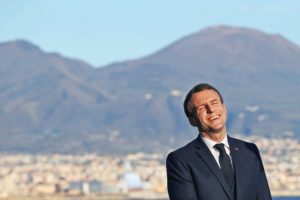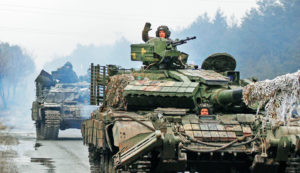Let’s call them “The Three Moscowteers”. Until Russian bombs and rockets fell on Ukraine last week, three of the leading candidates in the French Presidential elections were enthusiastic supporters of Vladimir Putin. Between them, Éric Zemmour, Marine Le Pen and the hard-Left leader, Jean-Luc Mélenchon, commanded over 40% of the popular vote.
Putin has admirers and apologists in many countries, from Donald Trump, Steve Bannon and Tucker Carlson in the United States to Nigel Farage and Jeremy Corbyn in Britain. He bought the German political establishment with gas pipelines and part of the British Conservative Party with roubles.
In France, however, the self-proclaimed, patriotic forces of anti-elite politics — on both the far-Right and the hard-left — admired Putin for free (give or take a Russian bank loan to Marine Le Pen in 2017). There is no equivalent degree of overt Putin worship in any other large, Western country — except possibly the United States.
When he held a peace summit with Emmanuel Macron just before he sent his tanks into Ukraine, Vladimir Putin humiliated the French president. But he also did him an unwanted favour: war in Ukraine has raised Emmanuel Macron’s chances of re-election in April from “pretty good” to “near-certain”.
After the first bombs fell, the Moscowteers scrambled to distance themselves from the Russian president. Now, with scarcely a mea culpa, they have reverted to blaming the West for not giving in to Moscow on Nato expansion, and have resumed their mockery of Macron for his ill-fated peace missions to Putin last month.
This approach will appeal to part of their core support, which is viscerally anti-European, anti-American, and anti-Nato. But it is unlikely to impress the wider electorate.
Last Friday, Zemmour gave a strangely incoherent speech to a cheering and flag-waving rally of his faithful supporters in Chambéry in the French Alps: he both criticised Putin and defended him, appealing for peace and glorified war. “We know the Russians and the Russians know us. Putin’s Russia exists in the 19th century and regards war as a way of defending its strategic vision,” Zemmour said. “But the countries of the West no longer have the stomach for war… We need to consider the consequences of that.” The West, he implied, should actually be fighting “wars of civilisation” which “our elites will not accept”. In other words, he meant wars against Islam.
Perhaps more surprising is what Zemmour didn’t say: he made no mention in Chambéry of Putin’s repeated threat to use nuclear weapons. The man who presents himself as the saviour of his nation now finds himself aligned with a man threatening to destroy it. So does Marine Le Pen and so does Jean-Luc Mélenchon.
As a result, I believe that the presidential election is all but over. President Macron has until Friday to enter the race formally. Despite the failure of his peace mission, the war will freeze the campaign and swing many moderate, non-ideological voters behind him.
Macron may or may not have been too indulgent with Putin last month. But three of his main adversaries have praised or idolised him for years. Even the centre-Right challenger Valérie Pécresse — no Putin fan — represents a party whose last Prime Minister, François Fillon, was until last week a salaried Moscow ally. After enormous pressure from Pécresse, Fillon finally resigned last week from the board of the Russian petro-chemical giant, Sibur.
Of course, Macron’s opponents still have a couple of straws to cling to: most damagingly, the confrontation with Russia will worsen fuel and food inflation, which was already threatening a Macron second term. It will, however, also give the President political cover to take action, such as temporary tax cuts, to ease price rises — steps that would normally have been impossible just before a presidential vote.
Meanwhile, Moscow will doubtless turn several armoured divisions of online trolls and fake social media accounts on the French campaign. Yet a Moscow blitz of fake news against Macron was expected anyway. Its effect will also be limited: it will mostly be seen by the anti-European, anti-Nato, Macron-detesting portion of the electorate, which would never have voted for him in any case.
This raises a more fundamental question: why was Putin so popular in France in the first place?
The 2022 election may be over, but the fellow-travelling of the three leading election candidates is a stark reminder of the fragility of the French political status quo. Disaffected French cultural figures, from Gérard Dépardieu to Michel Houellebecq, are also long-standing Putin fans, infected by a variant of the pro-Soviet virus which swept through much of French intellectual life in the Fifties.
Will the surge of nationalism in French politics be damaged by its association with Vladimir Putin? In the short term, yes. In the longer term, however, the same problems will produce the same resentments and the same arguments. The key man here is Éric Zemmour.
On the Left, Jean-Luc Mélenchon is a Jurassic politician, fighting his last election. For him, defending Putin was part of the unthinking baggage of being anti-American, anti-Nato and anti-European. Ditto for Marine Le Pen. In any case, her political star is waning. Moscow certainly thinks so; she was refused Russian loans this time around.
Of the Three Moscowteers, Zemmour has the most to lose. He represents — or represented — a rising power in French politics, if not for 2022 then for 2027.
For Mélenchon and Le Pen, Putin was their “enemy’s enemy”. Their thinking went no deeper than that. Zemmour epitomises something else: the strange attraction that Putin has come to hold on parts of the intellectual hard-Right in France and elsewhere. Zemmour admires Putin not despite what he is but because of what he is. Although Jewish himself, he has long idolised Putin as a defender of “Christian values” and “male values” against the onslaught of liberalism, feminism and gay rights.
It’s hardly surprising, then, that a new hashtag has appeared on French Twitter in recent days: #VladimirZemmour. French media and political opponents have started to trace the many links and similarities between Putinism and Zemmourism. Both men exploit tendentious narratives of national decline and national betrayal. Both shamelessly rewrite their country’s history to exaggerate past glories and nurse grudges against rival nations or the forces of “internationalism”.
For Putin, the indivisible Russian people and Russia’s natural right to be one of the world’s great powers have been betrayed by his weak or foolish predecessors and by the anti-Russian aggression of the West. For Zemmour, France’s natural superiority and right to cultural domination have been eroded over the centuries by foreign and internationalist conspiracies and by the betrayals of its own political classes. The latest betrayal is “le grand remplacement” — an allegedly deliberate plan by “international finance” and “the elites” to replace the white race by brown and black people.
In 2016, Zemmour wrote that the Russian President was “the last bastion against the hurricane of the politically correct which, starting in America, has destroyed all the traditional structures of family, religion and nation”. He is “the only European leader to defend traditional society, rooted in its own history and culture. All other Western leaders have turned the rootless, self-empowered individual into a jealous and demanding God.”
Two years later, he added: “I dream of a French Putin emerging but there is none…” Three years after that, Zemmour stopped being an essayist and TV pundit and decided to run for the role of “French Putin” himself.
In the large back-library of Zemmour’s Putin panegyrics, you will find scarce mention of the dismantlement of any semblance of democracy in Russia, and the imprisonment and poisoning of opponents. But while Western governments and businesses have ignored or chosen to live with these crimes. Zemmour has implicitly endorsed them. As recently as last September, Zemmour said that France should abandon Nato and the EU and enter a “Russian alliance…that would be far more reliable”.
Until now, Zemmourist converts from the centre-Right — mostly very young or retired, well-educated and well-off — have brushed off such excesses. They prefer to focus on Zemmour’s energy and his eloquence in skewering the failures and evasions of the liberal, pro-European consensus. Yet they are now confronted with facts that they preferred to ignore: Zemmour’s gut instincts are authoritarian and undemocratic. His Putin-worship is not a tangential flirtation to annoy “the elites”. It is the core of Zemmourism.
As I have argued before, Zemmour’s political project was always long-term. It hoped to succeed over two election campaigns, not one. But I believe that Zemmour has been lastingly discredited by his Putin worship. In his place, another figure will doubtless emerge to pursue his vision of a strong, nationalist anti-European Right into the 2027 campaign (when Macron, if re-elected, cannot run again).
One of the likely candidates for that role is Marine Le Pen’s estranged niece, Marion Maréchal — although she is another long-standing Putin-fellow-traveller. Yet the New Right will not go away in France any more than it will in the United States. Memories fade. The core issues of identity, fear of Islamism and the need for better-shared prosperity will remain.
Part of the identity of the New Right is to mock international and European institutions, even the very idea of human rights or international law. No doubt the muddles and compromises of Nato and the EU will be mocked again and again in the coming months or even years as those flawed organisations struggle to support Ukraine without firing a shot and risking nuclear war.
It would, all the same, be pleasant to imagine that some on the new, nationalist Right — and not just in France — might start to reconsider and regret some of the Strange Gods they have worshipped in recent years. Vladimir Putin — a corrupt, violent, anti-democratic man who detests the values of the West — has been recruited as a poster-boy for French and American ultra-patriotism. Many people who, like Eric Zemmour, are sincerely devoted to the values of the past, now find themselves trapped on the wrong side of history.
Disclaimer
Some of the posts we share are controversial and we do not necessarily agree with them in the whole extend. Sometimes we agree with the content or part of it but we do not agree with the narration or language. Nevertheless we find them somehow interesting, valuable and/or informative or we share them, because we strongly believe in freedom of speech, free press and journalism. We strongly encourage you to have a critical approach to all the content, do your own research and analysis to build your own opinion.
We would be glad to have your feedback.
Source: UnHerd Read the original article here: https://unherd.com




